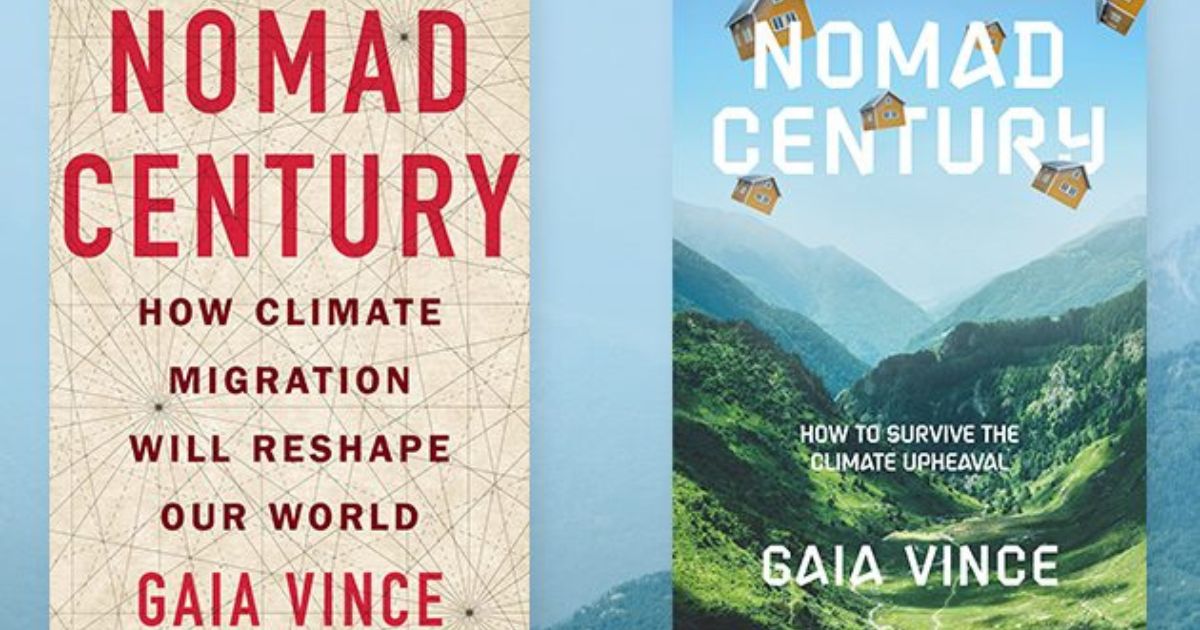Nomad Century by Gaia Vince is the most consequential book on climate change since Bill McKibben’s The end of nature. I see other reviewers say something similar, ‘The Observer’, for example, decreeing it “should be read by every person on the planet”.
I read the hardback from Allen Lane/Penguin but I note that other imprints have the more telling subtitle – ‘How Climate Migration Will Reshape Our World’.
We are used to thinking of the movement of species south (or north in the northern hemisphere) in response to climate change but perhaps we forget to realise it applies to the human species too.
“Migration is our way out of this crisis.” “For humans, migration is deeply interwoven with cooperation.”
Vince means that with trade etc., we have made collaborative systems, but she is stating an aspiration that we will cooperate in a migratory endeavour. Though she knows that borders and nations are not fit for this purpose, Vince wants us to operate from the position that “Migration is not the problem; it is the solution.” But she knows “climate apartheid” is already in operation and says the question is “how humanely we treat each other as we migrate“. How we answer that question will determine whether “upheaval proceeds smoothly or with violent conflict”. Regarding borders and nations, Vince also knows that “viewed historically, it is our national identities and borders that are the anomaly”. ‘
“This is a chance to recognize the dependence of all of us on each other, and our species’ dependency on the natural world.”
Nation states repurposed can become an agent correcting that “apartheid”. Spain, for example, by mutual agreements, took in migrants from North Africa and Latin America from 2000-2009 (6 million migrants, 14% of the population and 20% of the workforce). Despite significant existing unemployment and poverty, there was no backlash because Spain integrated migrants into the life of the country (and eventual citizenship) through social, economic and educational policies and mixed-use, highly connected urban areas. This cost Spain two billion Euros, a cost which was presented to the host populace by government advocacy, the Minister, for example, pointing out that the migrants were “paying the taxes that finance the pensions for a million Spanish people”. That is the point. As countries develop, their birth rates drop, and fewer workers support more non-working-age people. As tropical and southern climes become unliveable with mean average temperatures equal to the Sahara now, population movements to northern regions (and a limited few areas in the south such as Patagonia, NZ and Tasmania) become mutually beneficial as well as just.
The political meaning is profound. The message should become about working together on adaptation so that we can avoid or minimise social chaos and violence. It means leaving behind the tone of anger and finger pointing. Instead, the tone we should be moving into is more like that which accompanies embarking together on a joint project.
It is not too late to lower the fractiousness so that politics becomes about ways and means, policies, agreements and compacts.
Gia Vince
Gia Vince is an award winning British environmental journalist, broadcaster and non-fiction author. She writes for The Guardian, and, has been news editor for Nature and online editor for the New Scientist.
She is best known for her book, Adventures in the Anthropocene: A Journey to the Heart of the Planet We Made, for which she won the 2015 Royal Society Winton Prize for Science Books
Nomad Century: How to Survive the Climate Upheaval by Gaia Vince is published by Allen Lane.
Cover image courtesy of Gaia Vince @WanderingGaia


